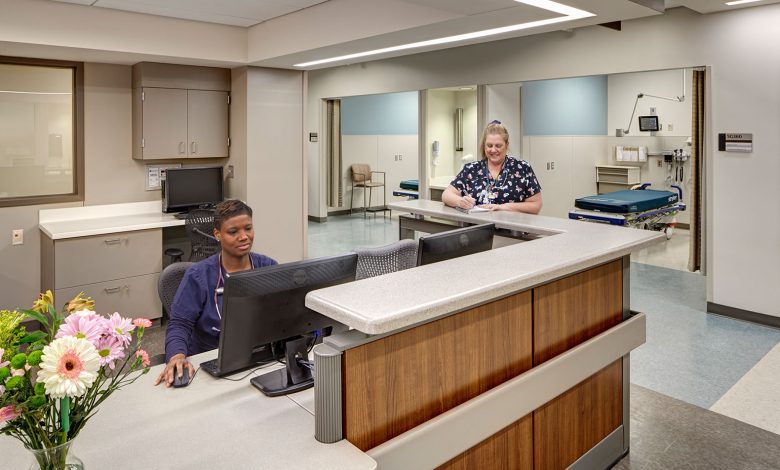What Makes Louisville Countertops Essential in Hospital and Clinic Settings

Louisville countertops are crucial surfaces in hospitals and clinics, serving essential functions that aid doctors, nurses, and patients. Let’s delve into the reasons why countertops are indispensable in these settings and how they contribute to maintaining a safe and efficient healthcare environment.
1. Cleanliness and Hygiene
Louisville countertops in hospitals and medical centers are meticulously cleaned and disinfected to prevent the spread of germs and infections. Maintaining cleanliness on these surfaces is paramount to ensure the well-being and safety of patients and medical staff.
2. Organization and Efficiency
Louisville countertops play a pivotal role in maintaining a well-organized medical environment. Doctors and nurses rely on these surfaces to store and access essential medical tools promptly, streamlining patient care and workflow efficiency.
3. Patient Care Areas
Countertops in patient rooms and examination areas provide a dedicated space for doctors to review medical charts, document patient notes, and place necessary medical instruments. These surfaces facilitate seamless patient care delivery and information management in Louisville.
4. Laboratory and Testing Areas
In Louisville laboratories and testing facilities, countertops made of materials like granite, quartz, and marble serve as indispensable workstations for conducting experiments, handling samples, and operating specialized equipment. Their flat and stable surfaces, characteristic of these durable materials, are crucial for ensuring accurate testing and analysis in healthcare diagnostics.
i. Granite Countertops:
Known for their strength and durability, granite countertops in Louisville KY offer excellent resistance to scratches, heat, and chemical exposure. In laboratory settings, where precision and cleanliness are paramount, granite surfaces provide a sturdy platform for conducting experiments and handling sensitive samples without compromising accuracy.
ii. Quartz Countertops:

Engineered quartz countertops combine the durability of natural quartz with resin binders to create non-porous surfaces that are resistant to stains and bacterial growth. These qualities make quartz countertops ideal for laboratories requiring stringent cleanliness standards and frequent sanitization, ensuring reliable and hygienic testing environments.
You Should Also Read:
iii. Marble Countertops:
While softer than granite and quartz, marble countertops are prized for their elegance and unique veining patterns. In laboratory applications where aesthetics meet functionality, marble surfaces can be found in less rigorous testing areas or specialized research settings. Their smooth and polished finish still offers a suitable platform for certain experiments and sample handling processes.
5. Medical Equipment Placement
Countertops are strategic locations for placing vital medical equipment such as diagnostic devices, monitoring tools, and treatment instruments. Accessible placement on countertops ensures that medical staff can quickly retrieve and utilize these tools during patient assessments and treatments.
6. Storage of Medications
Pharmacy countertops are designed for safe medication preparation, storage, and dispensing. Pharmacists rely on these surfaces to accurately measure, package, and label medications, ensuring precise dosage and patient safety in medication management.
7. Communication Hub
Countertops serve as communication hubs where healthcare professionals coordinate schedules, update patient records, and share critical information. These central locations streamline interdepartmental communication and collaboration for efficient patient care delivery.
8. Accessibility for Patients
Certain countertops, such as those at reception desks and patient service areas, are designed with patient accessibility in mind. Patients can comfortably interact with staff, complete necessary forms, and access essential services thanks to these thoughtfully designed surfaces.
9. Specialty Countertops
Specialized areas like surgical suites and emergency rooms require countertops with specific features such as durability, stain resistance, and easy cleanability. These specialty countertops are tailored to meet stringent healthcare standards and support critical medical procedures effectively.
10. Infection Control Measures
Countertops in healthcare settings adhere to strict infection control protocols. They are often made of non-porous materials that are resistant to bacteria growth, and regular cleaning schedules are implemented to minimize infection risks.
11. Emergency Response Preparedness
During emergencies and medical crises, countertops serve as essential stations for quick access to emergency supplies, medications, and communication devices. Their strategic placement ensures swift response times and effective coordination among medical teams.
12. Comfort and Accessibility for Caregivers
Countertops in nurse stations and caregiver areas are designed ergonomically to reduce strain and fatigue during long shifts. These comfortable workspaces contribute to maintaining caregiver well-being and productivity.
13. Patient Education and Counseling
Countertops in patient education rooms or counseling areas provide a conducive space for healthcare professionals to engage with patients and families. Interactive materials, educational tools, and informational resources can be easily accessed and shared on these surfaces.
14. Regulatory Compliance
Healthcare countertops comply with industry regulations and standards for safety, sanitation, and accessibility. They are designed and maintained to meet stringent guidelines set forth by health authorities to ensure patient and staff well-being.
15. Technological Integration
Modern healthcare countertops may feature integrated technology such as touchscreens, digital displays, or charging ports. These technological advancements streamline workflows, facilitate data access, and enhance communication within healthcare settings.
16. Sustainability Practices
Many healthcare facilities prioritize eco-friendly countertop materials and sustainable practices. From recycled materials to energy-efficient manufacturing processes, these countertops align with environmental stewardship goals while maintaining high functionality and durability.
Conclusion
Louisville countertops are not just simple surfaces in hospitals and clinics; they are integral components that contribute to a safe, organized, and efficient healthcare environment. By understanding the diverse roles and functionalities of countertops in healthcare settings, we appreciate their significance in supporting quality patient care, promoting staff well-being, and ensuring regulatory compliance within the healthcare industry.





